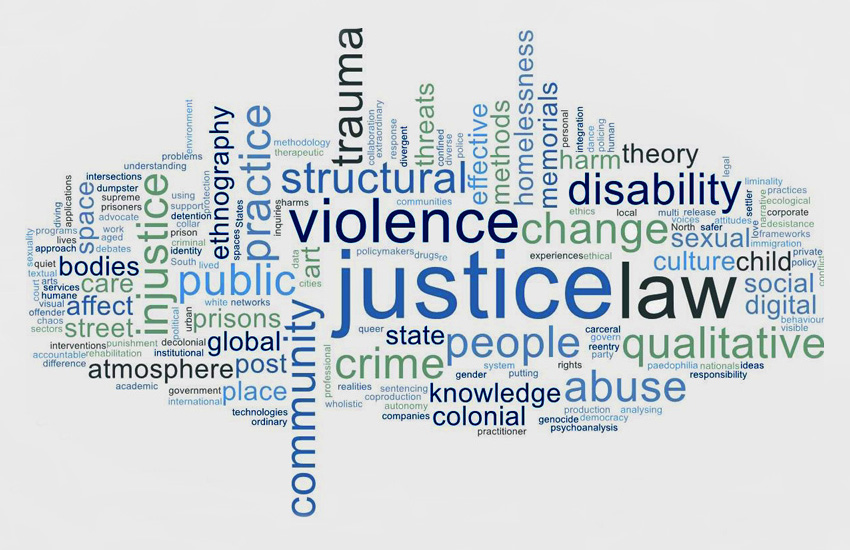Criminology
Criminology is the critical examination of crime and justice policy and practice. Criminology at Melbourne seeks to understand how society constructs and responds to crime.

Criminology at Melbourne
We take a critical approach to understanding crime. We work in partnership to create new ways of addressing violence and injustice, and achieving just outcomes. We raise questions and challenge assumptions about laws and law enforcement. Why are some criminalised and others are not? Who defines ‘crime’ and what counts as violence? Which policies and practices hold promise for reducing violence and inequality, and for achieving justice?
In seeking answers to such questions at individual, corporate and state levels, we apply knowledge from a wide range of disciplines to challenge everyday assumptions and to collaborate on new approaches to understanding and addressing crime.

As the oldest continuing Criminology program in Australia, we look at crime and justice locally and globally, from youth justice to state crime, homelessness to drug policy, policing to prisons, gender violence to terrorism, and corporations to Treaty and truth commissions. We have a strong commitment to partnering with communities and organisations to make research matter, and create social and structural change.
Associate Professor Diana Johns, Chair in Criminology
Explore our research
Criminology at Melbourne draws on a multidisciplinary field, applying theories and translating research to understand local and international crime problems, to inform the development of effective crime and justice policy and practice.
-
Achieving justice in response to street and public sexual harassment
The project aims to develop victim-centred conceptualisations of justice in response to street harassment.
-
Against Erasure: Digital Witnessing of Manus Island Detention Centre
This project is developing a digital representation of dismantled immigration detention centre at Lombrom, Manus Island, Papua New Guinea.
-
Lockdown and the legal process
Researching the ways in which legal practitioners responded to the COVID-19 pandemic, including the impact of lockdown on courts, jury trails, and other aspects of the legal process.
-
Minutes of Evidence
A collaboration between Indigenous and non-Indigenous researchers, education experts, performance artists, community members, government and community organisations that sheds light on the little-known history of the 1881 Victorian Parliamentary Coranderrk Inquiry.
-
Nga Tūmanakotanga
Nga Tūmanakotanga (Turning the Tide on Prison Violence) is a project investigating the commissioning of institutional violence and how it might best be prevented.
-
Telling Stories with Ribbons
Ballarat, Loud Fence and the Aftermath of Institutional Child Sexual Abuse
-
The effects of female genital mutilation laws in Australia
The project seeks to produce insights into the effects of female genital mutilation (FGM) laws and the potential impacts of proposed legal initiatives.
Partnerships, engagement and philanthropy
-
Comparative Network on Refugee Externalisation Policies (CONREP)
CONREP is an international, interdisciplinary six-university network that researches the impact and effects of the externalisation of refugee policies in two regions.
-
Justice-involved Young People (JYP) Network
Connecting people working for better outcomes for justice-involved young people in Victoria.
-
Partnership with Oxford University Centre of Criminology
Criminology at the University of Melbourne has formed a partnership with the University of Oxford’s Centre of Criminology and is engaging in a range of collaborative teaching and research activities.
-
The John Barry Memorial Lecture
With the support of the Barry family, the Criminology discipline within the School of Social and Political Sciences presents the prestigious John Barry Memorial Lecture.
-
McNiff Bequest
The University of Melbourne has established the Francine V. McNiff Chair in Criminology as part of a significant donation of $4 million by former staff member and Magistrate, Ms Francine McNiff.
Study with us
Our subjects give you skills in critical thinking, conceptual analysis, and specialised and practical justice knowledge.
Undergraduate
- Bachelor of Arts Criminology Major
- Bachelor of Arts (Degree with Honours)
- Bachelor of Arts (Law and Justice Minor)
Graduate coursework
- Specialist Certificate in Criminology (Forensic Disability)
- Specialist Certificate in Criminology (Offender Management)
- Graduate Certificate in Arts
- Graduate Diploma in Arts
- Graduate Certificate in Arts (Advanced)
- Graduate Diploma in Arts (Advanced)
- Master of Criminology
Graduate research
Meet our Criminology staff
Criminology at Melbourne is taught by a team of engaged and passionate teachers and researchers. We work across the intersections of law, society and culture, studying the local and global dimensions of crime, social harms and trauma, and the policy and practice implications of criminological research.
